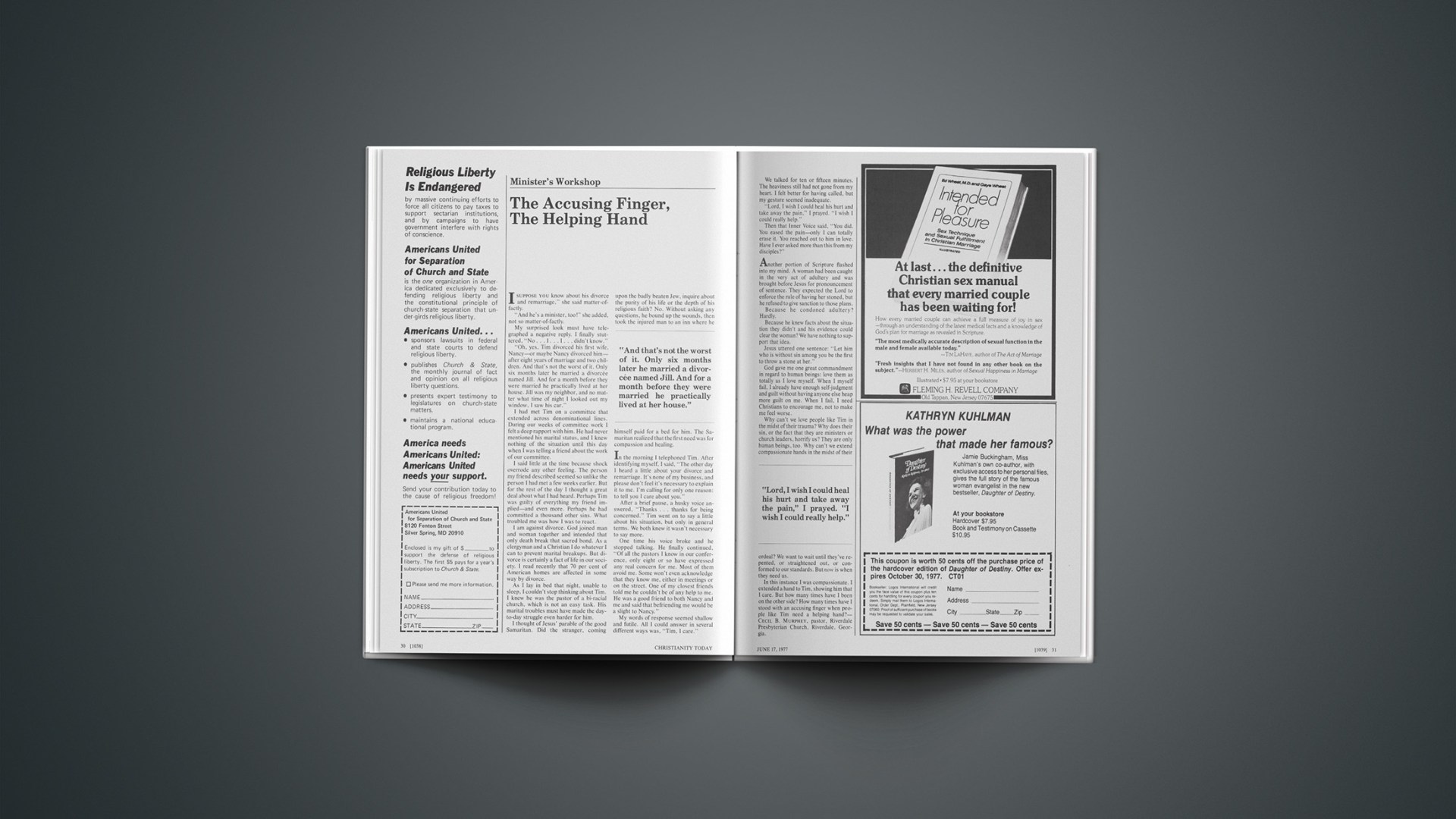I suppose you know about his divorce and remarriage,” she said matter-of-factly.
“And he’s a minister, too!” she added, not so matter-of-factly.
My surprised look must have telegraphed a negative reply. I finally stuttered, “No … I … I … didn’t know.”
“Oh, yes, Tim divorced his first wife, Nancy—or maybe Nancy divorced him—after eight years of marriage and two children. And that’s not the worst of it. Only six months later he married a divorcée named Jill. And for a month before they were married he practically lived at her house. Jill was my neighbor, and no matter what time of night I looked out my window, I saw his car.”
I had met Tim on a committee that extended across denominational lines. During our weeks of committee work I felt a deep rapport with him. He had never mentioned his marital status, and I knew nothing of the situation until this day when I was telling a friend about the work of our committee.
I said little at the time because shock overrode any other feeling. The person my friend described seemed so unlike the person I had met a few weeks earlier. But for the rest of the day I thought a great deal about what I had heard. Perhaps Tim was guilty of everything my friend implied—and even more. Perhaps he had committed a thousand other sins. What troubled me was how I was to react.
I am against divorce. God joined man and woman together and intended that only death break that sacred bond. As a clergyman and a Christian I do whatever I can to prevent marital breakups. But divorce is certainly a fact of life in our society. I read recently that 70 per cent of American homes are affected in some way by divorce.
As I lay in bed that night, unable to sleep, I couldn’t stop thinking about Tim. I knew he was the pastor of a bi-racial church, which is not an easy task. His marital troubles must have made the day-to-day struggle even harder for him.
I thought of Jesus’ parable of the good Samaritan. Did the stranger, coming upon the badly beaten Jew, inquire about the purity of his life or the depth of his religious faith? No. Without asking any questions, he bound up the wounds, then took the injured man to an inn where he himself paid for a bed for him. The Samaritan realized that the first need was for compassion and healing.
In the morning I telephoned Tim. After identifying myself, I said, “The other day I heard a little about your divorce and remarriage. It’s none of my business, and please don’t feel it’s necessary to explain it to me. I’m calling for only one reason: to tell you I care about you.”
After a brief pause, a husky voice answered, “Thanks … thanks for being concerned.” Tim went on to say a little about his situation, but only in general terms. We both knew it wasn’t necessary to say more.
One time his voice broke and he stopped talking. He finally continued, “Of all the pastors I know in our conference, only eight or so have expressed any real concern for me. Most of them avoid me. Some won’t even acknowledge that they know me, either in meetings or on the street. One of my closest friends told me he couldn’t be of any help to me. He was a good friend to both Nancy and me and said that befriending me would be a slight to Nancy.”
My words of response seemed shallow and futile. All I could answer in several different ways was, “Tim, I care.”
We talked for ten or fifteen minutes. The heaviness still had not gone from my heart. I felt better for having called, but my gesture seemed inadequate.
“Lord, I wish I could heal his hurt and take away the pain,” I prayed. “I wish I could really help.”
Then that Inner Voice said, “You did. You eased the pain—only I can totally erase it. You reached out to him in love. Have I ever asked more than this from my disciples?”
Another portion of Scripture flashed into my mind. A woman had been caught in the very act of adultery and was brought before Jesus for pronouncement of sentence. They expected the Lord to enforce the rule of having her stoned, but he refused to give sanction to those plans.
Because he condoned adultery? Hardly.
Because he knew facts about the situation they didn’t and his evidence could clear the woman? We have nothing to support that idea.
Jesus uttered one sentence: “Let him who is without sin among you be the first to throw a stone at her.”
God gave me one great commandment in regard to human beings: love them as totally as I love myself. When I myself fail, I already have enough self-judgment and guilt without having anyone else heap more guilt on me. When I fail, I need Christians to encourage me, not to make me feel worse.
Why can’t we love people like Tim in the midst of their trauma? Why does their sin, or the fact that they are ministers or church leaders, horrify us? They are only human beings, too. Why can’t we extend compassionate hands in the midst of their ordeal? We want to wait until they’ve repented, or straightened out, or conformed to our standards. But now is when they need us.
In this instance I was compassionate. I extended a hand to Tim, showing him that I care. But how many times have I been on the other side? How many times have I stood with an accusing finger when people like Tim need a helping hand?—CECIL B. MURPHEY, pastor, Riverdale Presbyterian Church, Riverdale, Georgia.










